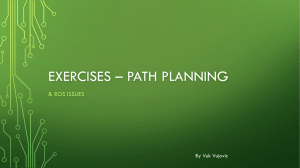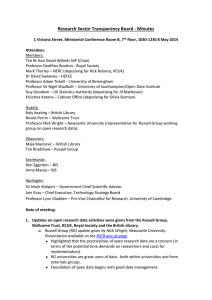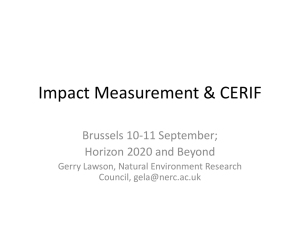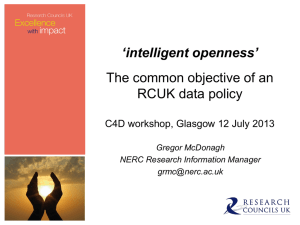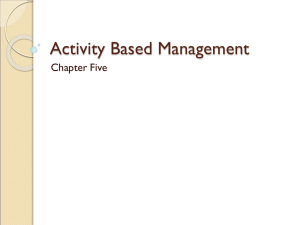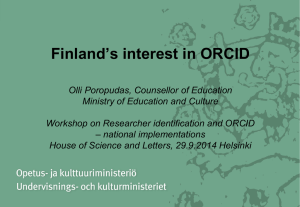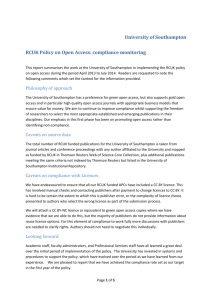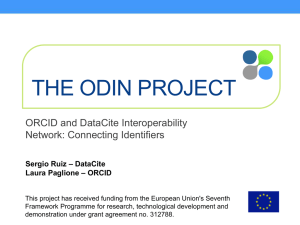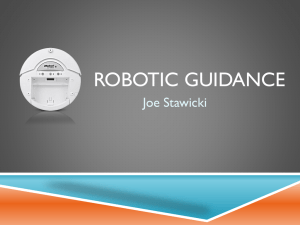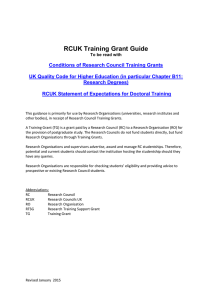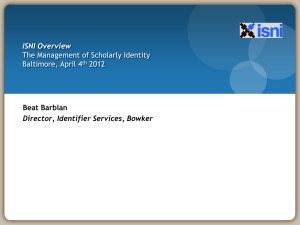Research Organisations
advertisement
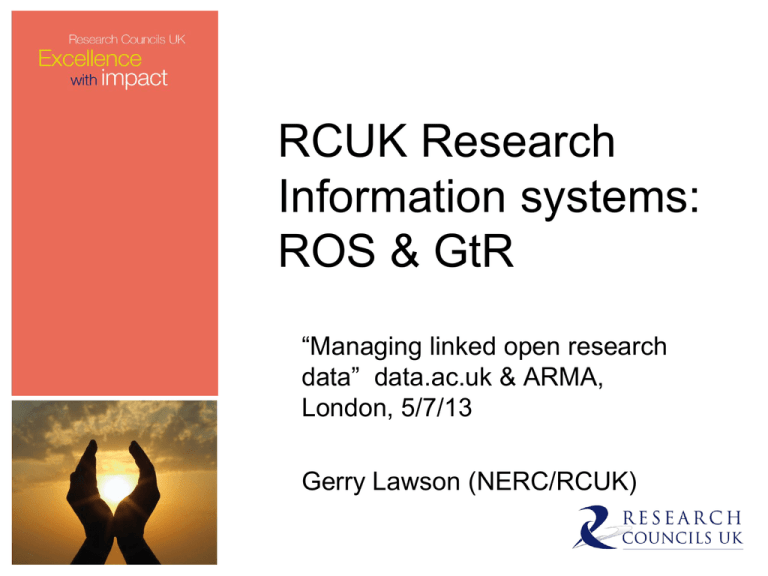
RCUK Research Information systems: ROS & GtR “Managing linked open research data” data.ac.uk & ARMA, London, 5/7/13 Gerry Lawson (NERC/RCUK) RCUK recognises the reporting burden for HEIs • In 2010 HESA, AHUA and UCISA undertook a survey of reporting with 40 HEIs and found 550 unique reports/year: • Of which: – – – – – – – – HE Funding Bodies HE Regulation and Reporting NHS Optional surveys/ publications Other funding bodies Professional/academic accreditation Statutory reporting TOTAL 112 43 17 56 68 154 98 543 http://landscape.hesa.ac.uk/hebrg-survey-of-statutory-and-external-returns-help-us-to-help-you/ Research Information collection in everyone’s interest Accountability: Specified in Council Delivery Plans and scorecards Regular monitoring, including indicators Performance management – impact reporting Ad-hoc reporting to Ministers, Parliament, Public (metrics AND narratives) Advocacy: Bidding in Comprehensive Spending Reviews Working with national & international funding partners Awareness Council Grants on Web Systems Gateway to Research portal and API Impact Reporting Requirements for BIS BIS Impact Reporting (2) BIS Impact Reporting (3) Implementing ROS in ePrints The ROS Outcome Collection Types 1. Publications 2. Collaborations 3. Other Research Output 4. Collaboration/ Partnership 5. Further Funding 6. Staff Development 7. Dissemination/ Communication 8. IP/Exploitation 9. Award/Recognition 10. Impact 11. Key Findings Collecting metadata on datasets ROS Development Issues • Still a young system - started only in 11-12 (12-13 for NERC) • Redevelopment will take place before next collection campaign in Jan 14 • Current Issues The Excel bulk upload omits 3 of the Outcome Types The CERIF upload is (so far) only available for publications Master data problems if a PI accesses ROS independently of data collected in a HEI CRIS system) Data quality – CrossRef metadata completion is not 100% reliable for all publication types; “Authority Lists” are needed for organizations Updating of new and revised grants not frequent enough. Scope for harmonisation of Outcome Types, Attributes & Vocabularies? Scope for greater interoperability with Research Organisations Microsoft’s repository system (Zentity) is no longer supported ROS & RF Harmonisation – is it possible? • RCUK – is conducting a review of ROS and Research Fish • Possible harmonisation of Outcome Types, Attributes and Vocabularies (LOVs) – some of which will remain Council specific. Main differences highlighted… ROS Outcome Types 1. Publications 2. Collaboration/Partnership 3. Further Funding 4. Staff Development 5. Dissemination/ communication 6. Impact on policy 7. Other Research Output 8. Intellectual Property 9. Exploitation 10. Impact Summaries 11. Award and Recognition 12. Key Findings RF Outcome Types 1. Publications 2. Collaborations 3. Further Funding 4. Next Destinations 5. Engagement Activities 6. Influence on Policy , Patients & Public 7. Research Materials 8. Intellectual Property 9. Development of Products & Interventions 10. Impacts on the Private Sector 11. Awards and Recognition 12. Use of Facilities Gateway to Research - Aims • To deliver, by December 2013 a web-based Portal giving a single public point of access to search and analyse information from 7 Councils (plus TSB) on – Research inputs (money, people, abstract, objectives, planned impacts, initial partners) – from RCUK Grants Systems – Research outcomes (publications, impacts, key findings, patents, IP, collaborations, next destinations etc) – from ROS and Research Fish • Joint BIS/ RCUK/ HEI initiative to increase the visibility for RCUK funded research, and eventually to include other research funders • To have an initial focus on improving the link between the research base and Industry – particularly SMEs. • Emphasis on Open Access to Research Information and Research Data Gateway to Research – Developments Needed http://gtr.rcuk.ac.uk/ Improvements needed: faceted search (pre or post main search); fuzzy searches; intramural funding; studentships; classifications; co-funding; consortium/split awards; project partners; more research outcomes – including datasets; improved person and organisation identifiers; weekly updates from ROS/RF/JeS; show collaborator types; better ranking of search results (e.g. relevance, publications, citation impact – not just project finance); APIs & Hack Days. JISC Partner Project – G4HE Gateway for Higher Education Aims to engage with GtR to improve the information exchange between Higher Education Institutions and the Research Councils. Develop tools and interfaces to allow both human and machine access to data held on GtR, and elsewhere where that is required; Based on validated use-cases shown to have specific and demonstrable value to HEIs. Names Authorities: Organisation IDs • • Higher Education Institutions - 300+ listed by UCAS) Research Organisations - 250 funded by RCUK (including some overseas) – Independent Research Organisations (56 recognised by RCUK) – Research Council Institutes (BBSRC 6, MRC 33, NERC 6, STFC 5) • • • Organisations (JeS lists 47,000 parent organisations and 160,000 in total) HESA “Institution Profile Record” 12/13 will clarify UK HEI department names annually from 2013 – and map in % terms to “Cost Centres” and REF “Units of Assessment” Other sources of OrgIDs: – – – – – – Ringgold (350k organisations worldwide with publisher focus – linked to ISNI) Companies House (3 million+ companies in UK) Dunn and Bradstreet (213 million companies globally) UK Provider Reference Number (UKPRN - 25,000 providers in UK) EU Participant Identification Codes (number not available) International Standard Name Identifier (ISNI 6.4 million, 747,979 researchers) Names Authorities: ORCID Users Researchers Research Organisations Research Funders Information Aggregators 50 members Uptake 7,500 IDs with UK email accounts 23,000 Unique UK IP contacts Features Multiple email addresses ResearcherID, CrossRef, AuthorID Scopus, DataCite (ODIN) links, ISNI interoperability Information Systems Altmetric, ANDS, AVEDAS, CrossRef,DataCite, Faculty of 100 Figshare, Knode, OCLC, Pubmed Europe, Symplectic, Thompson Reuters Interoperability – the UK Research Information Shared Service (UKRISS) ? See: http://ukriss.cerch.kcl.ac.uk/uk-research-information-shared-service-ukriss-project/ ORCID/ISNI People & Organisation Names Authority ROS ORCID/ CrossRef FundRef PMC CrossRef Publication Names Authority Research Fish HEBCI Gateway to Research UKRISS HEI CRIS/ IR (e.g. PURE) Publishers HEI CRIS/ IR (e.g. Symplectic) Repository Broker ???? Research Grant Names Authority HEI CRIS/ IR (e.g Avidas) WOS, DCI, Scopus DataCite Dryad DataCite Dataset Names Authority Don’t forget other funding sources http://www.ons.gov.uk/ons/dcp171778_302928.pdf... (ONS, March 2013) Open Research Information Going Forward ..... • Researchers – ORCID is a great success – now it is adding Affiliations, Patents and Grants. • Research organisations – we need an international Names Authority (ISNI) to link commercial and UK Institutional systems (Ringgold, Companies House, HESA Campus Survey, RCUK- CDR, ORCID etc.)? • Research funding – GtR could perhaps be a UK Research Funding “Names Authority” (also possible role for the Global Research Council). It will develop its API jointly with the community. • Researcher expertise – metadata is held in ORCID & research council systems – reviewer matching is possible using semantic matching against subject based thesauri (e.g. Mesh, Geotree, Engineering Village, Compendix, Gemet etc). • Research facilities – move to UK register of facilities/equipment availability. • Research outcomes – move to standardisation of types, attributes, vocabularies. • Research open access – need greater standardisation of OA metadata and DC Extensions – including APCs. • Research careers – need consistent use of OrcIDs, OrgIDs and timestamps – WoS and Scopus can help. • Research classifications – move to national standard like JACS4? • Research data – we need inks to DOIs and PURLs from papers, projects, institutions; also need more standardisation of discovery metadata. DataCite gives a good format for citations. The Data Citation Index may have a big impact.
